
18 minute read
FROM THE HEAD OF SCHOOL
RETURN OF THE DRAGONS
OUR HEAD OF SCHOOL REFLECTS ON DECISION-MAKING IN AN UNCERTAIN WORLD.
By Greg Ventre
HEAD OF SCHOOL
Those who know GCS know that the heart and soul of the school’s culture center around our time together on our beautiful campus. When the COVID-19 pandemic closed us and everyone else down last March, and we nimbly and successfully shifted into Digital Dragons mode, we were not anticipating that this would become our new reality, continuing through the spring, fall, and now, into winter. Nor did we imagine that it would so alter our shared core experience.
Many of us have found ourselves in an environment where— whether at home or work, for our family or our jobs—we make decisions often founded on no consistent base of information and where every option seems wrong, at least to someone. Additionally, strong opinions about what to do were voiced in every possible way, creating an unsettling and even adversarial climate. Economic difficulties, health and safety concerns, educational priorities, and family logistics all came into play.
Early on, we formed a group aptly named “Return of the Dragons,” both a homage to the great Bruce Lee and an optimistic hope that we would soon return to campus. The group consisted of experts from the medical and health and wellness sectors and school leaders in operations, health, academics, technology, and communications, as well as parents and trustees. This group has met weekly since March and has been essential in guiding us through these months. They formulated our COVID-19 health and safety policies and protocols and kept everyone informed and up-to-date. The group reached out to the community with health and wellness programs, prepared the campus facilities for our return, and ensured that our Digital Dragons program was functioning at a high level.
There is a difference between managing an emergency and trying to address a crisis. The former has protocols and procedures that help guide the community’s responses, whereas the latter usually has no comparative precedent. Personal decisions have a sweeping and potentially disastrous impact on others. In the case of this pandemic, decisions could literally involve issues of life and death.
Further complicating matters, the pandemic response became politicized, further polarizing the issues and dividing people. Every school life area was impacted, from sustainability areas such as enrollment, ancillary programs, revenue, and staffing to athletics, the arts, and campus maintenance.
Ultimately and unsurprisingly, many decisions were reduced to some basic criteria: “Who are we?” “What do we stand for?” and “What is best for our community?” With a constant and unrelenting amount of information pouring in, it became difficult to determine what was useful, accurate, or potentially harmful. Our rather deliberate approach was appreciated by many, frustrating to others.
Now that students from every division have spent at least some time on campus, we face a winter of dire warnings during an upsurge that has seen national, state and local numbers on the rise. So many parts of our lives have been impacted, but education may be irreparably altered. What
are the short- and long-term effects of digital learning? Can we gauge the impact of isolation on children’s physical and social development? On their cumulative academic progress and ability to engage in conversation, discussion, and debate without reading their classmates and teachers’ expressions and body language? Have family dynamics changed? So much has already been written about how the pandemic has changed college admissions. How will the schools and educators of the near future handle these challenges?
From my perspective, as I stare down the chute towards my final months as Head of School, I want to be sure we do not lose our sense of humanity, our empathy towards and understanding of one another as we move through these months. GCS has always been and remains a community— one that has experienced many good times and some difficult ones over 65 years, as one might expect. We do not exist in a vacuum. We are in the world. Even though some of the edges have been worn away during this unprecedented experience, when we look at ourselves, we must remember what drew us to this school in the first place. A search for community, a need to find different learning paths, to be part of an academy of learners of all ages, to be in a place that respected and valued everyone, a place of safety—for our minds, hearts, and diverse selves. In essence, a home. Are we all those things every minute of every day? Perhaps not. But for me, GCS has been all those things—a growing, living, and caring place. Yes, a home.
Jake Miller ’31, Addisyn Lenes ’31, and David Liker ’31 in front of the Manor House.
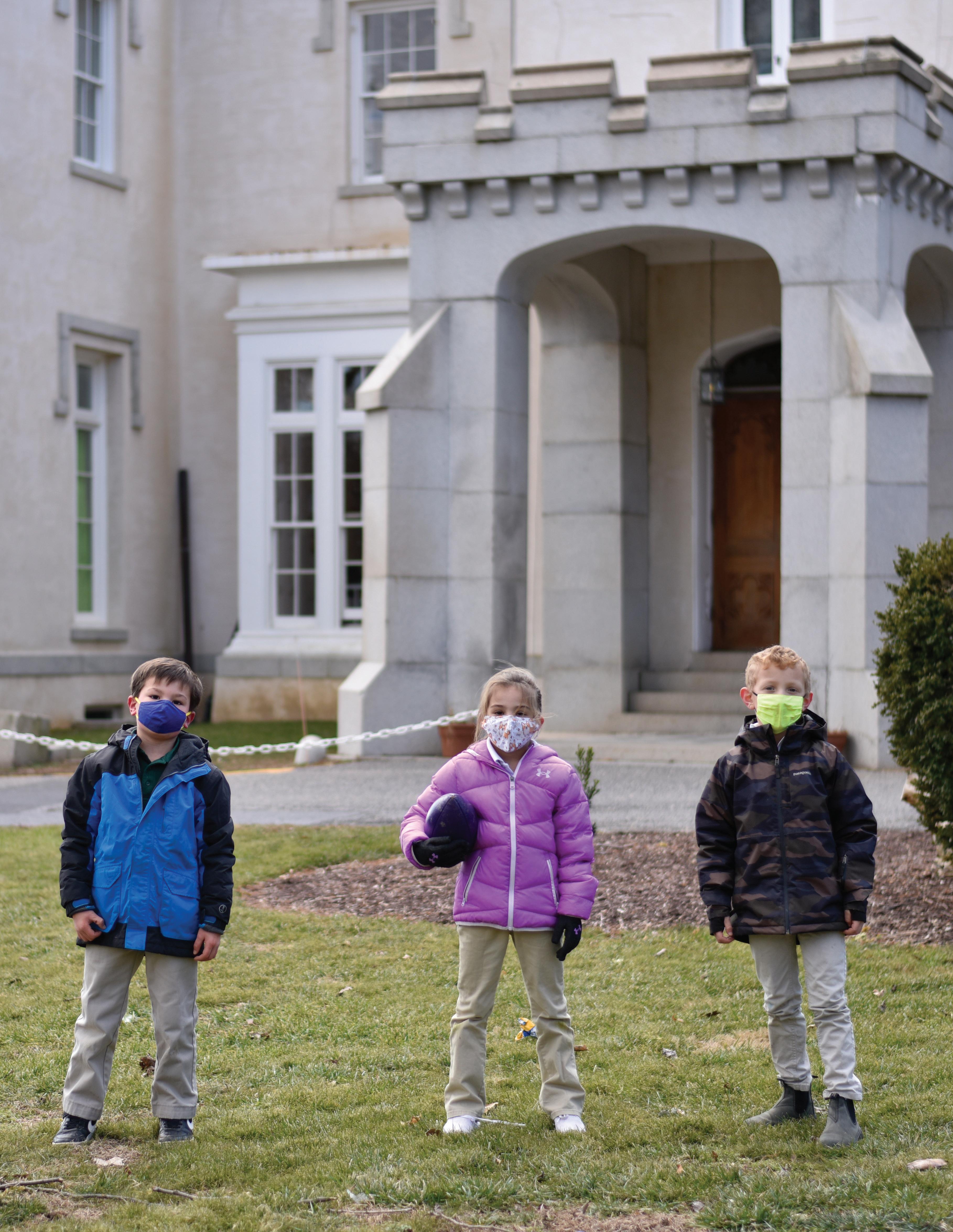

A CHANGE IS GONNA COME
GREG VENTRE LOOKS BACK ON 14 YEARS AT GCS.
By Mary Spiro
FREELANCE WRITER
The year 2020 taught us a thing or two about change. Like Sam Cooke’s song “A Change is Gonna Come,” we learned to change how we work, go to school, and interact with our family, friends, and neighbors. We also learned that change is hard, whether on a personal level or a societal one. Change is the only constant we can be sure of, and sometimes, change is the very thing we must do for everyone’s good.
For Greg Ventre, head of Glenelg Country School (GCS), change is a way of life. It has been the shifting foundation upon which he has built every day, leading the school. Since 2007, Ventre has guided GCS through ups and downs, ebbs and flows, prosperity, and loss. Through it all, many can confirm that you’d be hardpressed to find a person more well-suited for the task than Ventre. But come June 30, Ventre will make a change and step down as head of Glenelg Country School.
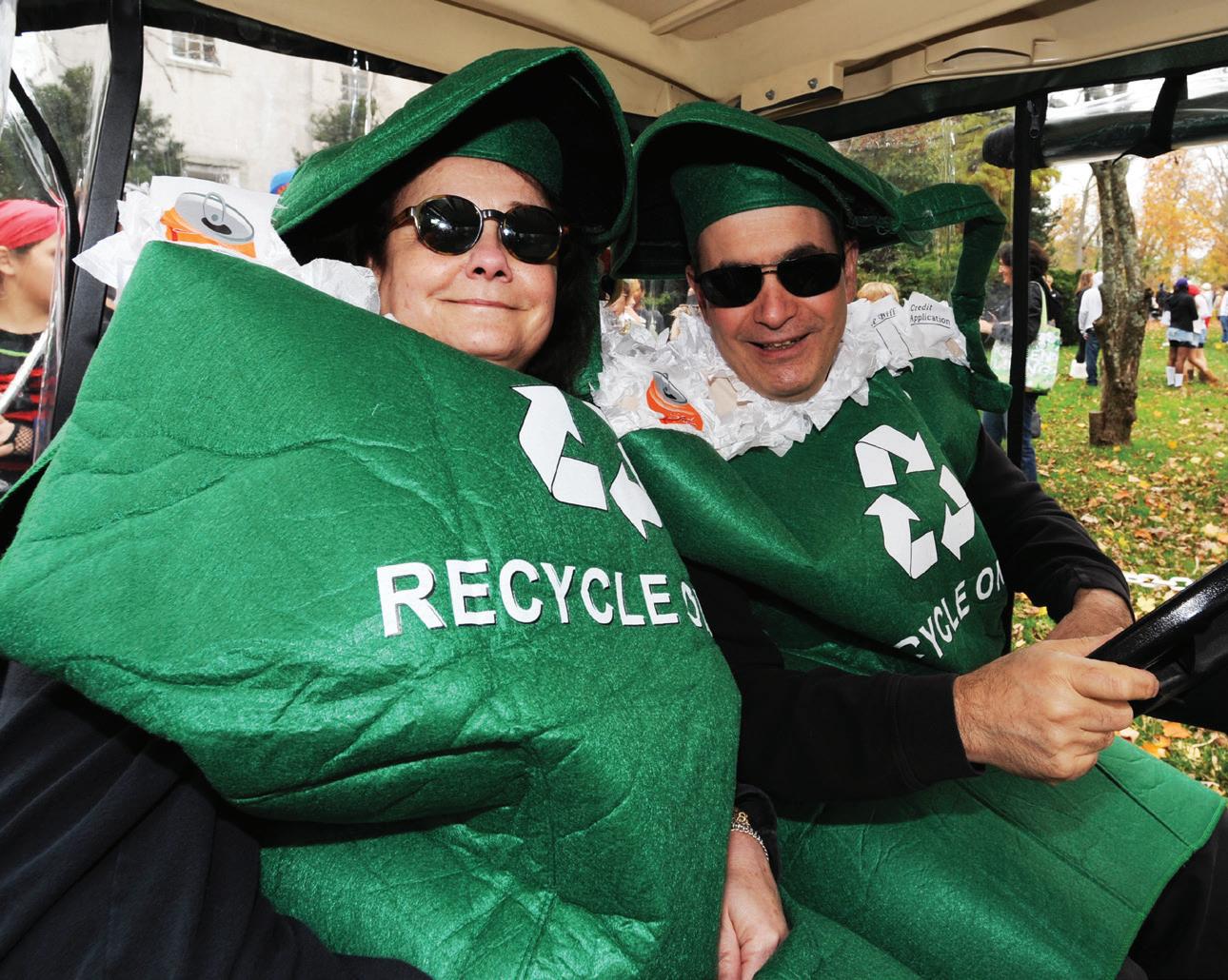

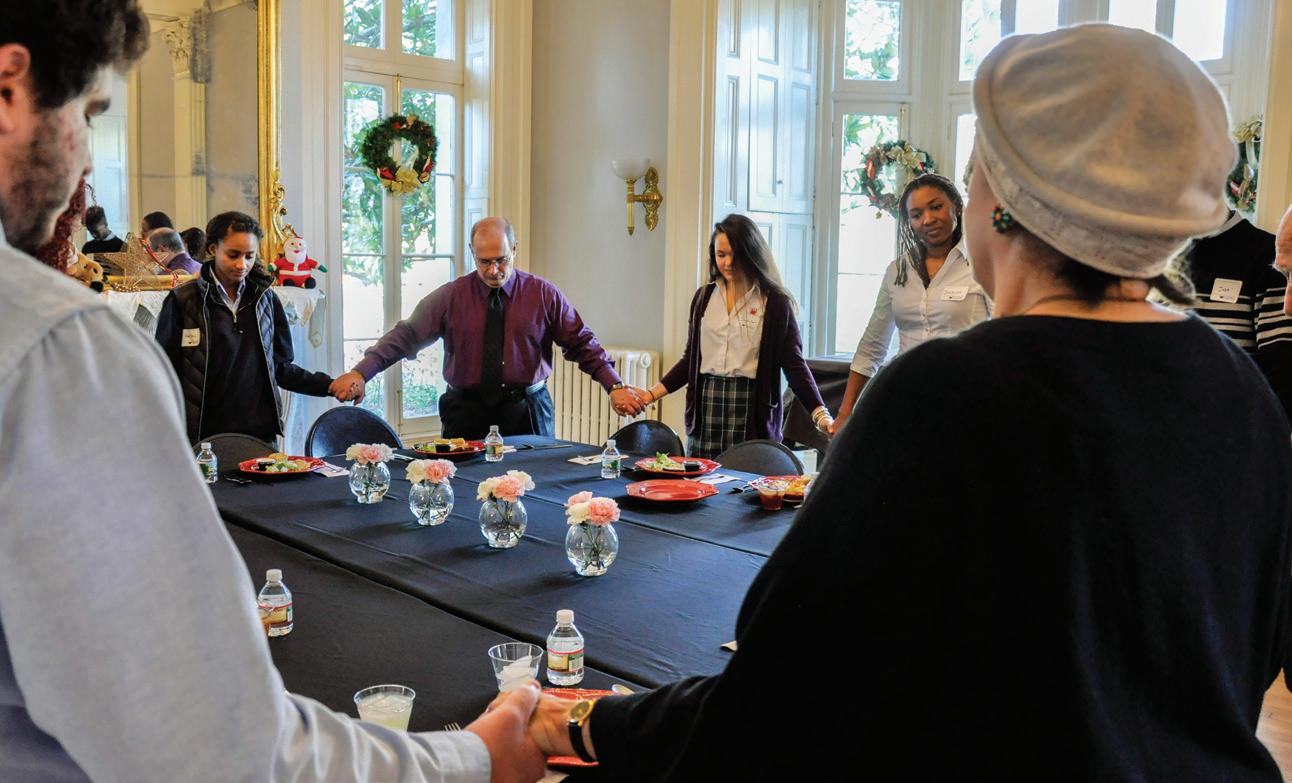
Top to bottom: Greg and Maddy Ventre, dressed as recycle bins, lead the annual Halloween Parade in 2009; Ventre during a Lower School jam session in 2010; Ventre at a 2015 event in the Manor House. JOURNEY TO GLENELG COUNTRY SCHOOL Ventre’s pathway to GCS had many of the traditional earmarks of a future in educational leadership, but with modest beginnings. Both of Ventre’s grandfathers were Italian immigrants who worked as longshoremen in Brooklyn, New York City.
“Private, independent schools were not part of my family’s universe,” Ventre explained.
Neither of his parents finished high school. His father left school to serve in the Navy following the attack on Pearl Harbor. His mother left school to work when four of her six brothers also decided to join the military. Instead, Ventre’s parents sent him to the best school they knew—the local Catholic high school—where he gained his inspiration and respect for the teaching profession.
“It was a great experience for me. I had wonderful teachers. My first teaching job, as a history teacher, was at that very school!” he said.
Ventre worked for several years in schools in Brooklyn and Manhattan. Then he took a job as an upper school head at the Staten Island Academy. It was there he met the woman who would become his wife, art teacher Madeline Metz, known as Maddy. Together, the couple moved a dozen times before arriving at GCS. They traveled to jobs at independent schools up and down the eastern seaboard. As an artist, Maddy would paint and sculpt wherever they roamed. Ventre held positions at The Canterbury School of Florida, the Cambridge School of Weston in Massachusetts, Miss Porter’s School in Farmington, Connecticut, and The Community School of Naples in Florida.
“I was never a person who wanted to be something else,” said Ventre. “I got the great gift of being exactly who I wanted to be—which was a teacher—and that was because I had great teachers.”
EARLY LIFE AS A SCHOOL HEAD Just before Ventre arrived at GCS to replace Rye Chapman, who led the school for 17 years, the campus population boomed.
“The school was at record enrollment with more than 800 students,” recalled board member emeritus, Rob Moxley, who chaired the search committee to replace Chapman.
“We were poised to take the school to the next level of quality and competitiveness.”
Selecting Ventre as the new school head was easy for board member Stacia Smith. “I liked Greg the second he came into the interview,” she said. “I remember writing across the top of his application, ‘This is our new headmaster!’”
Smith appreciated Ventre’s “engaging personality and self-deprecating sense of humor. “He had a low-ego and immense experience. I felt like he belonged at Glenelg.”
And so, Ventre and his wife moved into the school head’s residence, located near the campus entrance, across from athletic fields and the Upper School. “The role of school head is 24/7, 365,” Ventre explained. The fact that the school head residence is on campus makes this even more true.
“You can’t just walk out your front door in your pajamas to pick up the newspaper,” Ventre chuckled. “It’s a pastoral job. You are never NOT the school head, no matter where you are. It’s one of those jobs that requires every part of you to be involved. There are 1,000 people at the school every day, and if you approach the position as I do, you feel you are responsible for all of them.”
As expected, upon arrival, Ventre became fully immersed in school life.
John Feezer, board member emeritus, whose children are GCS alumni and has grandchildren currently attending GCS, can attest to Ventre’s dedication to the school and its people, noting that “he’s always interested in what’s going on in your life.” “When Greg came to Glenelg Country School, he fell in love with GCS, and GCS fell in love with him,” said Feezer. Ventre’s compassionate personality and character traits contributed significantly to the school’s success over the last 14 years, Feezer stated.
“He has a very thoughtful and considerate demeanor and has provided sensible leadership, [and] even with the challenges that he has had to face, he has never let the school down,” Feezer said. “He demonstrated how to be a true leader, remaining humble and always making GCS students his ultimate priority.”
Like Smith, Feezer also appreciates Ventre’s sense of humor.
“He doesn’t mind putting on a Halloween costume or getting on stage and singing with his guitar,” said Feezer. “I really respect his ability to get in front of a crowd and talk through important things and not hesitate one bit. He is knowledgeable about all aspects of the school, from facilities to academics. He’s right in there. Athletics, theatre, all the different aspects of the school community, he is on top of it.”
Ventre’s positive outlook and love for the school were put to the test within the first year of his tenure. In late 2008, the recession hit. Businesses failed, and parents lost discretionary income. Student enrollment declined as local families decided to send their children to Howard or Montgomery County schools, admittedly some of the nation’s best.
“It was his first great challenge, and he did extremely well by stepping up advancement,” Moxley said. Ventre was forced to freeze cost-of-living pay increases for faculty that year and delivered the bad news to each staff member personally. But instead of anger and disappointment, Moxley reported that Ventre had support from teachers.
“Many of them thanked him for the way he handled it,” he recalled.
Although school enrollment has not experienced the growth of the early 2000s, Moxley said that under Ventre’s leadership the school increased strategic fundraising and advancement efforts, increased marketing, adopted social media use, and improved the school’s website.
Bradley Smith, current Board of Trustees chairperson, agrees. Ventre’s “fourteen years of service spans a period of growth and achievement for our school, including the addition of the Little Dragons program and athletic stadium to our campus, the expansion of academic programs, multiple Cappies for the theater program, over two dozen athletic championships, and over $4 million in college scholarships awarded annually to our graduating Seniors.”
And despite his administrative role, Ventre continues to teach occasional history courses at GCS. Some Upper School students have been lucky enough to take his class “1968
In America” an era that holds a special place in his heart. Around this time, Ventre was attending university and forming his own philosophies about what was good and bad in teaching and education. But he said it is also a critical time in American history that students today should try to understand because many of the same issues remain relevant and unresolved.
A DEFINING MOMENT The day-to-day logistics of running a school bring apparent challenges. There are budgets to approve, parents to meet, students to encourage, faculty to support, alumni to engage, and many other unexpected and unpredictable things that can happen. Every day has a routine, but no day is alike— each filled with complexity.
It was on one of these complex and unpredictable days— September 27, 2018—when Ventre was handling a personnel issue. Returning home for a break, he found Maddy, his wife of 35 years, had suddenly passed away.
“There is just no way to prepare for it,” said Ventre. “We had been discussing the possibility of retiring in 2019…”
Moxley affirmed that the couple had a strong and loving partnership.
“Maddy was extremely supportive of Greg and his work at school and a great contributor in her own right,” Moxley said. “They truly were a team.”
Ventre admitted that he is not coping well with the loss of his wife. “Because of the kind of person Maddy was and the way she supported me, that’s why I could do this job.
This is not the kind of job you can do alone. She knew what it meant to be a school head’s partner. Everyone knows who you are. It was a blessing to have her there with me. If we were out together, people would not approach me about school stuff if she was there.”
The year 2018 also saw the death of school founders Kingdon Gould, Jr., and his wife, Mary. And in early 2019, Ventre said his best friend of many years also passed away.
“Maddy’s death, however, was the defining moment of my life,” Ventre said. At that moment, he began to think about his future at GCS seriously.
Ventre poses with “Head of School for the Day” winner Zakariya Rushdan ’23 in 2016. Rushdan spent the day fulfilling Head of School duties with the help of Ventre.
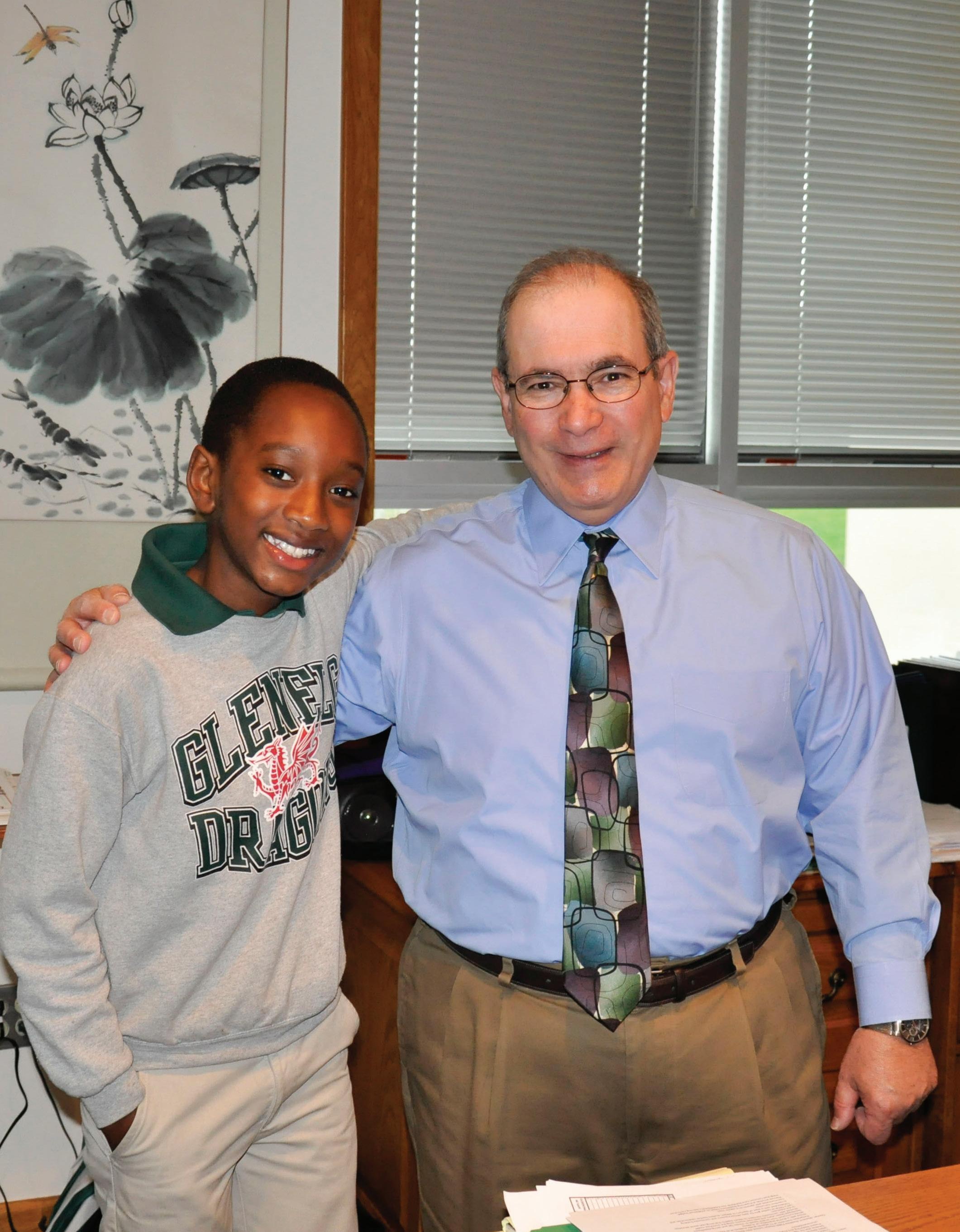

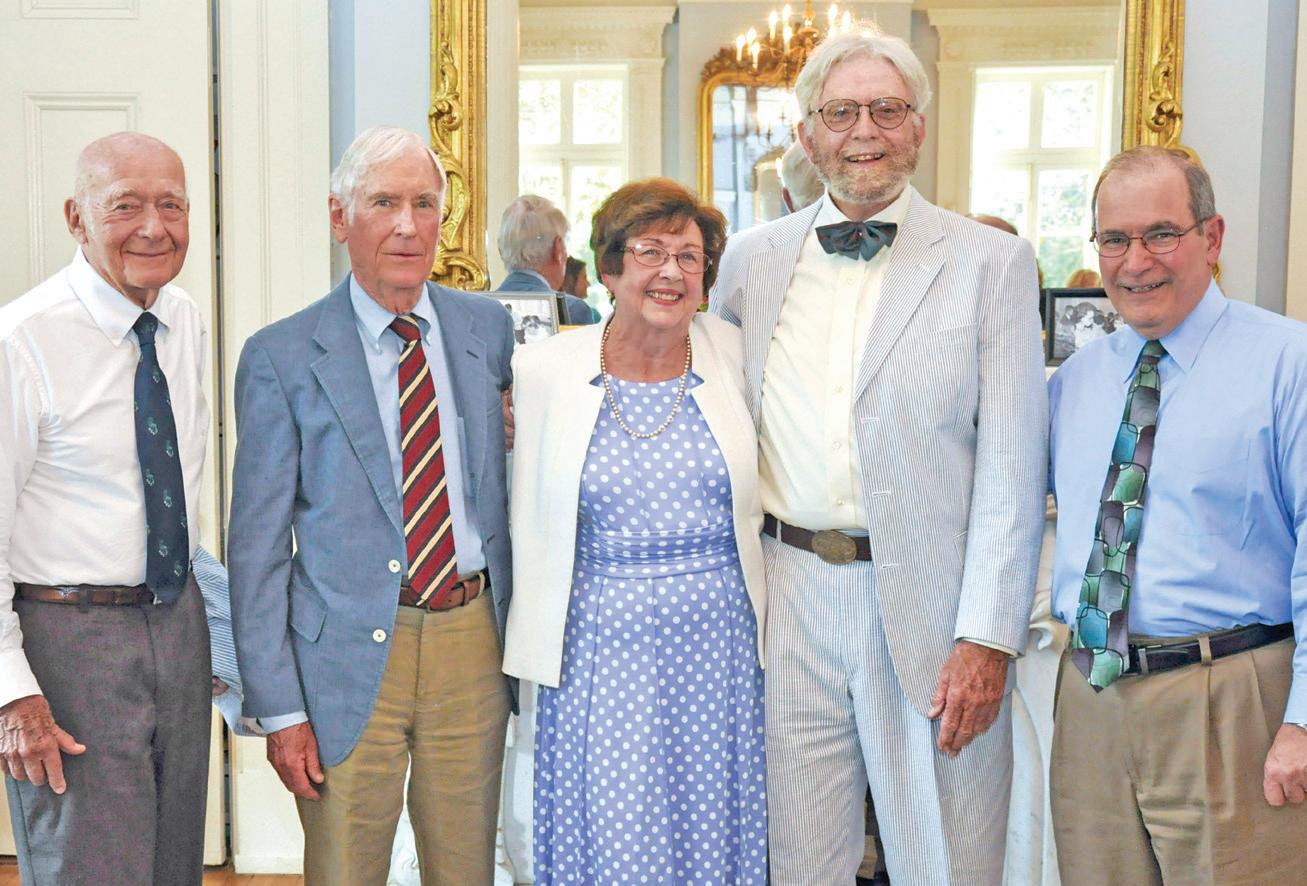


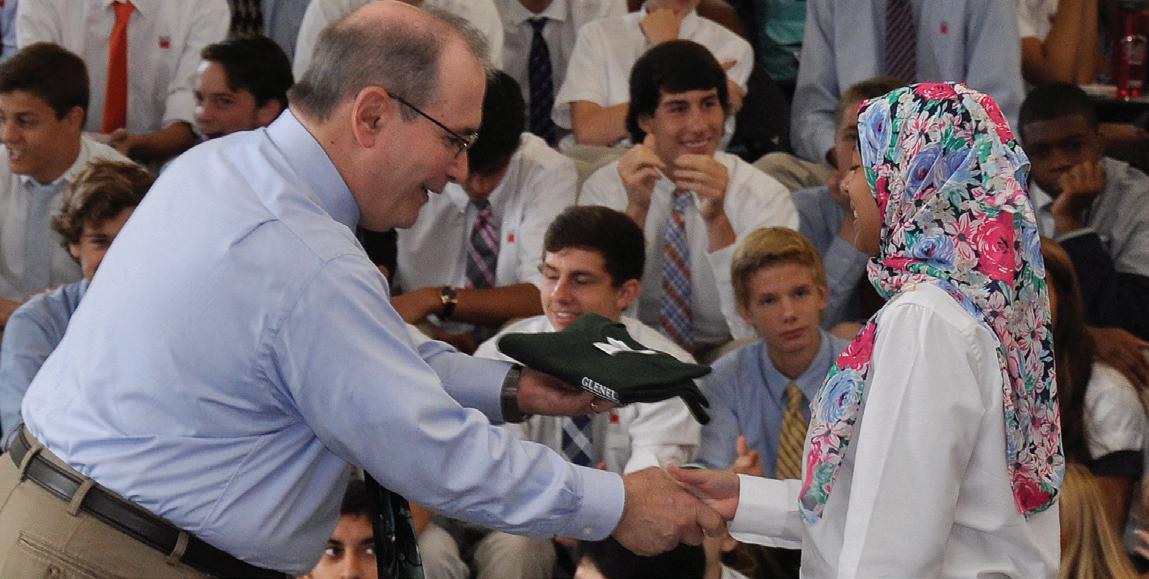
From top, left to right: Ventre and his wife Maddy at home with their bird, Rio; Kingdon Gould, former Head of School Charlie Miller, former Head of the Lower School Lynda Rotter, former Head of School Rye Chapman, and Ventre in the Manor House during Rotter’s retirement celebration in 2015; Ventre during the Green Dragon mascot’s graduation in 2010; Lower School students hug Ventre after a lunch visit in 2011; Ventre, a saavy guitar player, performs during a performing arts dinner in 2010; Ventre shows Morgan Adams ’18 his calendar during NAME’s 2010 Head of School shadow day; Ventre presents a new Upper School student with an Elgs team t-shirt during Forum; Ventre speaks at the 2009 Commencement.


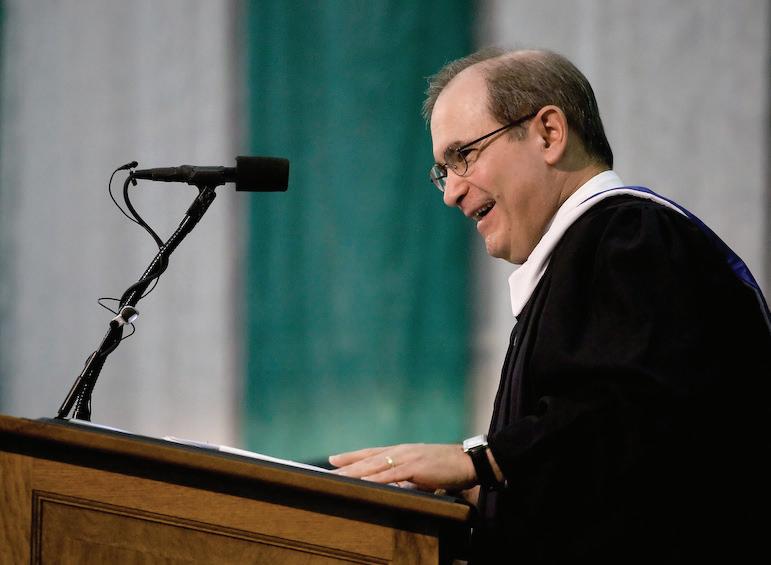
A NEW EVER-CHANGING NORMAL Following Maddy’s death, Ventre threw himself even deeper into school life. To a degree, it provided a kind of “therapeutic experience…giving me something else to focus on,” he admitted.
The natural spaces on campus provided respite from the educational hubbub. Ventre loved to take many long walks on the campus, especially on weekend mornings when no one was around, wandering through the dense stand of trees or over to the pond past the baseball field.
“It’s a place of contemplation and a place of serenity; it’s one of the most important things in my life,” Ventre said. “Maddy loved nature and animals, especially horses, and that is something that she and I shared.”
He also busied himself with the Campus Development Plan and the struggles it continues to face with the Howard County government and the school’s immediate neighbors. In hopes of developing the campus, GCS has been working since 2016 to attain conditional use approval.
“It’s been a drain not to be able to have the campus plan approved,” confides Ventre. “If there is one thing that I regret not being able to complete while I was here, it was to build better musical education facilities for the school. It won’t be accomplished until we get through this zoning process, and we raise money.”
And while these issues caused frustration, no one could have truly been prepared for the changes a global pandemic would bring. “There’s a difference between managing for
an emergency and managing for a crisis,” Ventre said. “There is no playbook for this, especially for schools. No matter what decision you make, it’s wrong for somebody.”
Even so, Ventre said Glenelg Country School was among the first schools to get their students and faculty quickly up to speed on a virtual platform. The plan worked so successfully the school even gained some enrollment from the public schools. “But no one expected that we’d still be dealing with the pandemic now,” Ventre added.
In the fall of 2020, the school’s youngest students—Little Dragons and Lower School students—returned to campus for in-person learning. Later, Middle and Upper School students returned for hybrid learning. But Ventre knows there is a “half-life” for the students who chose to remain
home this entire time. “There are screen fatigue and home logistics…it’s hard,” he noted. Yet, he looks forward to everyone returning full-time to campus.
Along with this disruption to the teaching process, Ventre said the pandemic had robbed students of the unique traditions that make life at Glenelg Country School special. “There are new students and families who have spent very little time on campus,” he said. During Ventre’s final months at the school, much time will be spent moving forward to deliver the best education and school experience possible to the student body.
THE FUTURE Stacia Smith feels that part of Ventre’s legacy will be “his visionary leadership, his phenomenal teaching, his humor, and his music…he was not afraid to take on difficult situations,” she said. “We will miss him very much, and I am sure whoever takes his place is going to bring an entirely different perspective.” Ventre is not entirely sure what the future holds for him since schools have been his world for half a century. He plans to stay in the area and enjoy coming to games and being a GCS sports fan without worrying about how the students are behaving. He plans to continue to teach through Johns Hopkins University, perhaps write nonfiction, and maybe volunteer at museums once things
reopen.
“It’s going to be difficult to look at next fall for the first time since I was 22 years old and not go to school,” he said.
For his successor, he hopes that person takes the time to understand and appreciate what he termed “the soul of GCS” and what it takes to be a leader.
“A school head needs to be self-aware,” Ventre said. “They also need to know when they have changed. It’s time for someone with a fresh perspective to bring Glenelg Country School into the next decade.”



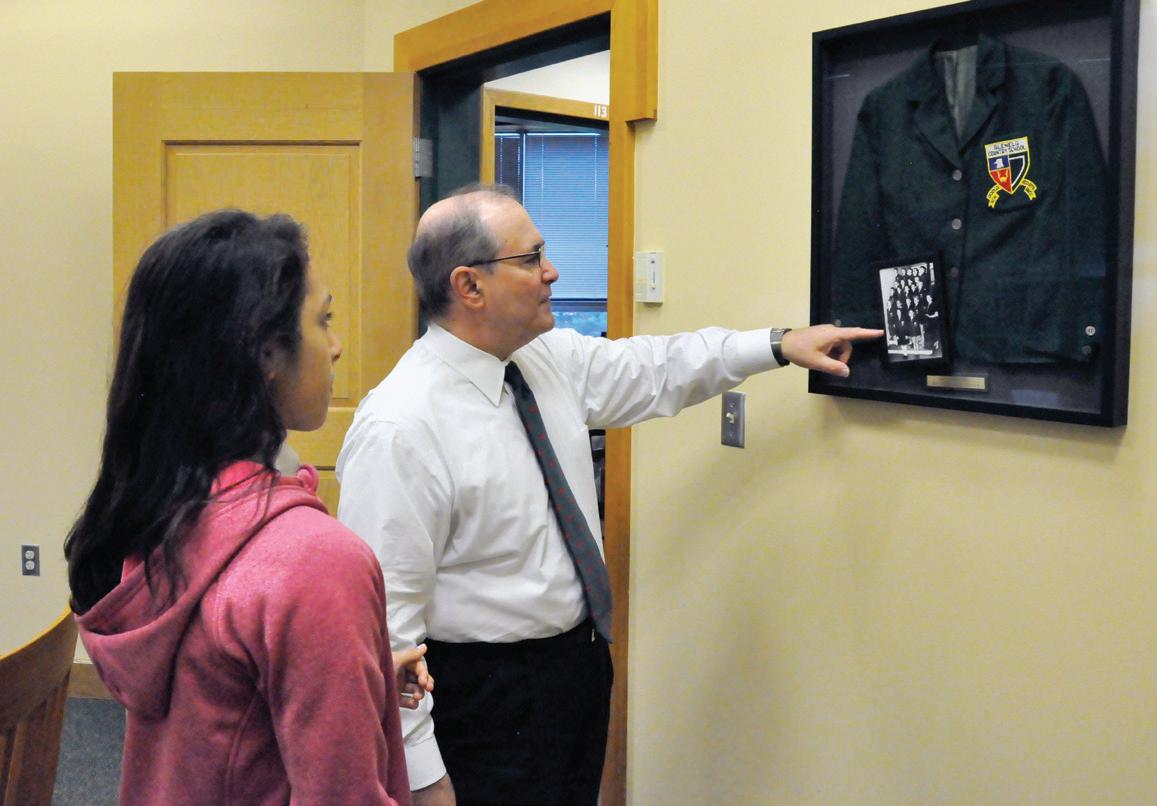


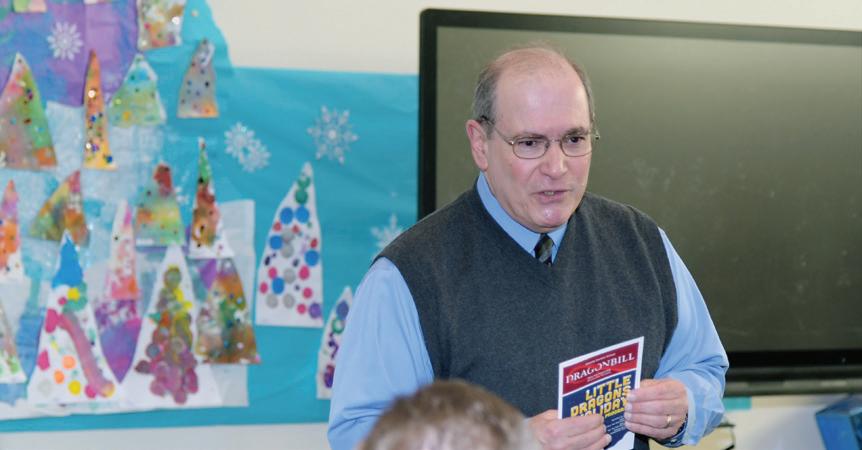
From top left to right: Ventre performs during the Upper School Forum with Soren Mattson ’09; Noor Singh ’21 is shown an early version of a GCS school uniform by Ventre in the administration offices in 2016; Ventre and a group of Lower School students in 2010 after receiving their Glen and Elg t-shirts in an annual tradition; Ventre congratulates the Class of 2014 during commencement; Sophia Jalali ’18 listens to Ventre during a 2010 shadow visit; Ventre participates in a student-led demonstration about Afghani kite flying in the Lower School in 2009; Ventre speaks at the Lower School’s 2019 holiday concert.







